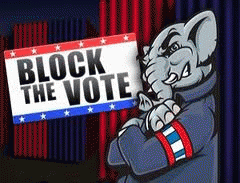"Of the total number of registered voters in the state, 239,333 (or 8.9%) did not possess a DMV-issued photo identification (either a driver's license or a non-driver's photo ID card) that would satisfy the requirements under Act R54. When disaggregated by race, the state's data show that 8.4% of white registered voters lacked any form of DMV-issued ID, as compared to 10.0% of non-white registered voters. In other words, according to the state's data ... minority registered voters were nearly 20% more likely to lack the DMV-issued ID than white registered voters, and thus to be effectively disenfranchised by Act R54's new requirements....
"Notably, seven counties with the highest percentages of registered voters who lack DMV-issued identification are also among the ten counties in South Carolina that have the highest percentage of voting-age persons who are non-white.
"The absolute number of minority citizens whose exercise of the franchise could be adversely affected by the proposed requirements runs into the tens of thousands. According to the state's statistics, there are 81,938 minority citizens who are already registered to vote and who lack DMV-issued identification."
South Carolina Republicans have displayed a cavalier attitude toward those voters lacking ID in the state. "Find me those people that think that this is invading their rights," said South Carolina Governor Nikki Haley, "and I will go take them to the DMV myself and help them get that picture ID." Yet given the number of registered voters in South Carolina who lack the new voter ID, transporting each one to the DMV would take Haley quite some time -- seven years, four months, three weeks and five days, Think Progress calculated.
Moreover, obtaining that government-issued photo ID isn't as easy as you'd think. To get the "free" ID the state must now provide, voters need to buy a passport or a birth certificate in order to authenticate their identity. "It's the stepsister of the poll tax," Judith Browne-Dianis, co-director of the Advancement Project, told me last year. Under the new law, many elderly black residents -- who were born at home in the segregated South and never had a birth certificate -- must now go to family court to prove their identity.
What justifies making it so difficult for certain segments of the population to exercise one of the country's most basic constitutional rights? South Carolina Republicans claim the law will stop a massive outbreak of voter fraud. Yet DOJ noted that "the state's submission did not include any evidence or instance of either in-person voter impersonation or any other type of fraud." A separate investigation by the South Carolina Elections Commission, based on the hysterical claim by the South Carolina Attorney General that 900 dead people voted in the 2010 election, also found no evidence of voter fraud or zombie voting
DOJ has also objected to discriminatory new voting restrictions in Florida and Texas under Section 5 of the Voting Rights Act. Section 5 mandates that covered jurisdictions with a history of electoral discrimination -- which includes parts or all of 16 states, including much of the South -- receive approval from DOJ or a federal court in Washington for any voting-related change to ensure that it does not make it harder for minority citizens to be able to vote.
On August 16, a federal court found that Florida's cutbacks to early voting violated the Voting Rights Act, since African-American voters were twice as likely as white voters to use early voting during the 2008 election. Seven GOP states are now challenging the constitutionality of Section 5 before the Supreme Court. Not surprisingly, South Carolina is one of them.






